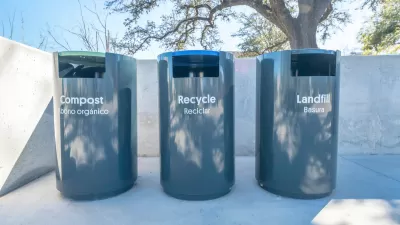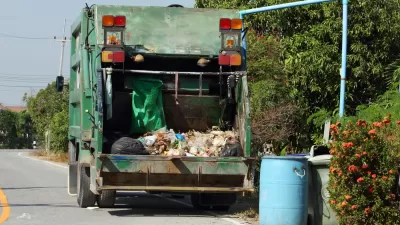Because city residents generate four times as much trash as rural residents, the rapid growth of the world's cities is leading to the rapid growth of the world's garbage. A new study examines future trash troubles and potential solutions.
"Global waste has bulged 10-fold in the last century," notes Ben Schiller. "And by 2025, it's set to double from where it is today, according to a study in the journal Nature. The chief reason: newly rich cities of the developing world."
"'As a country becomes richer, the composition of its waste changes. With more money comes more packaging, imports, electronic waste, and broken toys and appliances,' says the article by Daniel Hoornweg, Perinaz Bhada-Tata and Chris Kennedy. In turn, that leads to environmental problems, like toxic leakages from landfills, and plastic clogging oceans and rivers."
How can we slow, and eventually stop, the growth of the world's waste? "They recommend the rest of the world take a cue from San Francisco's book (it has a zero-waste policy), and introduce disposal fees that put a price on waste generation," explains Schiller. "'Increased education, equality, and targeted economic development' could cut population growth, limiting waste naturally, they add."
FULL STORY: By 2100, We'll Be Living In A World Of Garbage

Alabama: Trump Terminates Settlements for Black Communities Harmed By Raw Sewage
Trump deemed the landmark civil rights agreement “illegal DEI and environmental justice policy.”

Study: Maui’s Plan to Convert Vacation Rentals to Long-Term Housing Could Cause Nearly $1 Billion Economic Loss
The plan would reduce visitor accommodation by 25% resulting in 1,900 jobs lost.

Planetizen Federal Action Tracker
A weekly monitor of how Trump’s orders and actions are impacting planners and planning in America.

DC Extends Application Window for Outdoor Dining Permits
District restaurants will have until the end of November to apply, but businesses with permits in rush hour parking lanes must end operations on July 31.

Wind Energy on the Rise Despite Federal Policy Reversal
The Trump administration is revoking federal support for renewable energy, but demand for new projects continues unabated.

Passengers Flock to Caltrain After Electrification
The new electric trains are running faster and more reliably, leading to strong ridership growth on the Bay Area rail system.
Urban Design for Planners 1: Software Tools
This six-course series explores essential urban design concepts using open source software and equips planners with the tools they need to participate fully in the urban design process.
Planning for Universal Design
Learn the tools for implementing Universal Design in planning regulations.
Caltrans
Smith Gee Studio
Institute for Housing and Urban Development Studies (IHS)
City of Grandview
Harvard GSD Executive Education
Toledo-Lucas County Plan Commissions
Salt Lake City
NYU Wagner Graduate School of Public Service




























